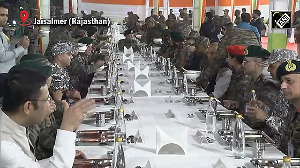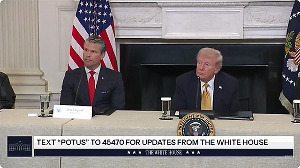History beckons Manmohan Singh.
After spending the best part of half a century as estranged democracies, India and the United States may be on the verge of "upgrading the relationship" to a level that may have been unthinkable even five years ago when US President Bill Clinton made an era-defining journey to India.
A senior adviser to the prime minister drew parallels two weeks ago -- in India Abroad, the newspaper published by rediff.com in the US -- with Dr Singh's visit to Washington, DC, which began on Sunday, with then US President Richard Nixon's 1971 decision to forge a new equation with China.
Though New Delhi and Washington were never adversaries the way Communist China and the US were, there was enough suspicion on both sides sharpened by Nixon's siding with Pakistan during the 1971 war and India's aligning with the then Soviet Union to ensure that both nations never grew close even when the conditions seemed apt.
The Clinton visit, the Jaswant Singh-Strobe Talbott talks, the Bush Presidency reaching out to India in the early months of the administration (before 9/11 compelled a swing to Pakistan), the Next Steps in Strategic Partnership, which President George W Bush and then prime minister Atal Bihari Vajpayee announced in November 2001 are all milestones on the highway to a new Indo-US relationship, expected to be forged during Dr Singh's encounter with President Bush at the White House on Monday, the first visit to the centre of American power by an Indian prime minister in four years.
Aboard AI 001 the Air-India Boeing 747 ferrying Dr Singh and his delegation to Washington, cautious optimism, rather than euphoria, was the dominant emotion.
Senior officials speaking on background warned against expectations of major tangible achievements from the visit, highlighting repeatedly the fact that putting the Indo-US relationship on a strong footing was achievement enough.
"A prime ministerial visit is a process," one adviser said on Saturday afternoon, "what we can hope is that this visit lays the ground for future visits when real business could get done."
The adviser pointed out on Sunday afternoon that the prime minister's address to Congress the US joint Houses of Parliament on Tuesday was just as important as his interaction with Bush and members of his Cabinet on Monday.
"What he says to Congress is important because these guys (the Senators and Congressmen) need to have a sense about what India and Dr Singh are all about. It also makes things easier for the Indian-American community when they write to their Congressman about matters that concern India if the Congressman has met Dr Singh."
The prime minister will spend a fair amount of time on Capitol Hill where the US Congress is located -- on Tuesday after his speech, meeting the movers and shakers in Congress, pumping the flesh, making an impression on the Senators and Congressmen who can hugely influence the way the United States perceives India.
If there is one subject emphasised on this prime ministerial visit, it is science and technology, and the prime minister's senior advisers spoke about the possibility that India and the US may reach an agreement on nuclear technology. Bush and US Secretary of State Condoleezza Rice have spoken about assisting India's civilian nuclear programme several times in recent months and there is a chance that the US may actually decide to supply nuclear fuel to the Tarapur atomic energy station near Mumbai. Again, knowing that the non-proliferation lobby in the US opposes any nuclear deal with India until New Delhi agrees to monitoring of its atomic energy programme, the prime minister's senior advisers were unwilling to concede it is a done deal.
"We won't know what safeguards the Americans want," one adviser said, "Inspection of existing nuclear installations is not under discussion. We could consider doing so (inspection) on new reactors."
Though economics will be certainly discussed on Monday, one adviser said, unlike the discussions on energy security which involve setting up a timetable for the five Indo-US energy sub-committees to meet in the months leading up to Bush's expected visit to New Delhi in January, there are no such committees set up to discuss economic themes.
The big economic initiative is the CEOs Forum, where Dr Singh and Bush have nominated 10 Indian and 10 American business leaders to freely discuss financial and other topics and report back to their respective leaders.
"We told the (Indian) business leaders you don't have a brief from the government," one adviser involved in setting up the process said. "You have to discuss things amongst yourselves and tell us (government) your views, which we could consider and possibly act upon." The adviser was unsure where the CEOs enterprise would eventually end up, but conveyed the excitement that it could change the way India is perceived by American business.
Foreign Secretary Shyam Saran and his team were busy this weekend, working with their American counterparts to cross the many 'I's and the 't's on the agreements that will be unveiled at the end of the prime minister's visit.
Even if the eventual agreements are couched in dense scientific jargon, making little sense to most Indians, one thing is certain the estranged democracies have kissed and made up. The Indo-US relationship won't be the same again.





